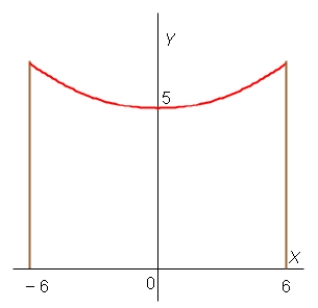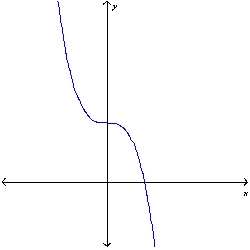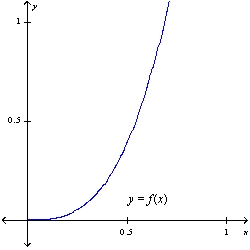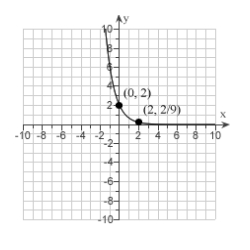Deck 3: Inverse Functions: Exponential, Logarithmic, and Inverse Trigonometric Functions
Question
Question
Question
Question
Question
Question
Question
Question
Question
Question
Question
Question
Question
Question
Question
Question
Question
Question
Question
Question
Question
Question
Question
Question
Question
Question
Question
Question
Question
Question
Question
Question
Question
Question
Question
Question
Question
Question
Question
Question
Question
Question
Question

Unlock Deck
Sign up to unlock the cards in this deck!
Unlock Deck
Unlock Deck
1/43
Play
Full screen (f)
Deck 3: Inverse Functions: Exponential, Logarithmic, and Inverse Trigonometric Functions
1
Find the limit. 


2
Simplify the expression. 
A)
B)
C)
D)
E)

A)

B)

C)

D)

E)


3
Evaluate the limit using l'Hôpital's Rule. 
A)0
B)1
C)( )
D)e

A)0
B)1
C)( )
D)e
( )
4
A telephone line hangs between two poles at 12 m apart in the shape of the catenary  , where x and y are measured in meters. Find the slope of this curve where it meets the right pole.
, where x and y are measured in meters. Find the slope of this curve where it meets the right pole. 
A)
B)
C)
D)
E)
 , where x and y are measured in meters. Find the slope of this curve where it meets the right pole.
, where x and y are measured in meters. Find the slope of this curve where it meets the right pole. 
A)

B)

C)

D)

E)


Unlock Deck
Unlock for access to all 43 flashcards in this deck.
Unlock Deck
k this deck
5
Find the numerical value of the expression. 
A)
B)
C)
D)
E)

A)

B)

C)

D)

E)


Unlock Deck
Unlock for access to all 43 flashcards in this deck.
Unlock Deck
k this deck
6
Find the derivative. 
A)
B)
C)
D)
E)

A)

B)

C)

D)

E)


Unlock Deck
Unlock for access to all 43 flashcards in this deck.
Unlock Deck
k this deck
7
Find the derivative of the function. Simplify where possible. 
A)
B)
C)
D)
E)

A)

B)

C)

D)

E)


Unlock Deck
Unlock for access to all 43 flashcards in this deck.
Unlock Deck
k this deck
8
Evaluate the limit using l'Hôpital's Rule. 
A)
B)3
C)0
D)

A)

B)3
C)0
D)


Unlock Deck
Unlock for access to all 43 flashcards in this deck.
Unlock Deck
k this deck
9
Find the exact value of the expression. 
A)
B)
C)
D)
E)

A)

B)

C)

D)

E)


Unlock Deck
Unlock for access to all 43 flashcards in this deck.
Unlock Deck
k this deck
10
If  is invested at
is invested at  interest, find the value of the investment at the end of
interest, find the value of the investment at the end of  years if the interest is compounded
years if the interest is compounded  .
.
A)
B)
C)
D)
E)
 is invested at
is invested at  interest, find the value of the investment at the end of
interest, find the value of the investment at the end of  years if the interest is compounded
years if the interest is compounded  .
.A)

B)

C)

D)

E)


Unlock Deck
Unlock for access to all 43 flashcards in this deck.
Unlock Deck
k this deck
11
Find the value of the expression accurate to four decimal places.sinh 4
A)29.3082
B)55.5798
C)15.145
D)27.2899
A)29.3082
B)55.5798
C)15.145
D)27.2899

Unlock Deck
Unlock for access to all 43 flashcards in this deck.
Unlock Deck
k this deck
12
Find the numerical value of the expression. 
A)
B)
C)
D)
E)

A)

B)

C)

D)

E)


Unlock Deck
Unlock for access to all 43 flashcards in this deck.
Unlock Deck
k this deck
13
The half-life of cesium-  is
is  years. Suppose we have a
years. Suppose we have a  -mg sample. How much of the sample remains after
-mg sample. How much of the sample remains after  years?
years?
A)
B)
C)
D)
E)
 is
is  years. Suppose we have a
years. Suppose we have a  -mg sample. How much of the sample remains after
-mg sample. How much of the sample remains after  years?
years?A)

B)

C)

D)

E)


Unlock Deck
Unlock for access to all 43 flashcards in this deck.
Unlock Deck
k this deck
14
Differentiate the function. 
A)
B)
C)
D)

A)

B)

C)

D)


Unlock Deck
Unlock for access to all 43 flashcards in this deck.
Unlock Deck
k this deck
15
The half-life of cesium  is
is  years. Suppose we have a
years. Suppose we have a  -mg sample. Find the mass that remains after
-mg sample. Find the mass that remains after  years.
years.
A)
B)
C)
D)
E)
 is
is  years. Suppose we have a
years. Suppose we have a  -mg sample. Find the mass that remains after
-mg sample. Find the mass that remains after  years.
years.A)

B)

C)

D)

E)


Unlock Deck
Unlock for access to all 43 flashcards in this deck.
Unlock Deck
k this deck
16
Evaluate the limit using l'Hôpital's Rule. 
A)75
B)25
C)15
D)

A)75
B)25
C)15
D)


Unlock Deck
Unlock for access to all 43 flashcards in this deck.
Unlock Deck
k this deck
17
Strontium-  has a half-life of
has a half-life of  days. A sample has a mass of
days. A sample has a mass of  mg initially. Find a formula for the mass remaining after
mg initially. Find a formula for the mass remaining after  days.
days.
A)
B)
C)
D)
E)
 has a half-life of
has a half-life of  days. A sample has a mass of
days. A sample has a mass of  mg initially. Find a formula for the mass remaining after
mg initially. Find a formula for the mass remaining after  days.
days.A)

B)

C)

D)

E)


Unlock Deck
Unlock for access to all 43 flashcards in this deck.
Unlock Deck
k this deck
18
Find the limit. 
A)
B)0
C)
D)1
E)

A)

B)0
C)

D)1
E)


Unlock Deck
Unlock for access to all 43 flashcards in this deck.
Unlock Deck
k this deck
19
If  is invested at
is invested at  interest, find the value of the investment at the end of
interest, find the value of the investment at the end of  years if the interest is compounded
years if the interest is compounded  .
.
A)
B)
C)
D)
E)
 is invested at
is invested at  interest, find the value of the investment at the end of
interest, find the value of the investment at the end of  years if the interest is compounded
years if the interest is compounded  .
.A)

B)

C)

D)

E)


Unlock Deck
Unlock for access to all 43 flashcards in this deck.
Unlock Deck
k this deck
20
Find the exact value of the expression. 
A)
B)
C)
D)
E)

A)

B)

C)

D)

E)


Unlock Deck
Unlock for access to all 43 flashcards in this deck.
Unlock Deck
k this deck
21
Use logarithmic differentiation to find the derivative of the function. 
A)
B)
C)
D)

A)

B)

C)

D)


Unlock Deck
Unlock for access to all 43 flashcards in this deck.
Unlock Deck
k this deck
22
Starting with the graph of  , find the equation of the graph that results from reflecting about the line
, find the equation of the graph that results from reflecting about the line  .
.
A)
B)
C)
D)
E)
 , find the equation of the graph that results from reflecting about the line
, find the equation of the graph that results from reflecting about the line  .
.A)

B)

C)

D)

E)


Unlock Deck
Unlock for access to all 43 flashcards in this deck.
Unlock Deck
k this deck
23
When a camera flash goes off, the batteries immediately begin to recharge the flash's capacitor, which stores electric charge given by  (The maximum charge capacity
(The maximum charge capacity  is and t is measured in seconds.) How long does it take to recharge the capacitor to 90% of capacity if
is and t is measured in seconds.) How long does it take to recharge the capacitor to 90% of capacity if  ?
?
A) seconds
seconds
B) seconds
seconds
C) seconds
seconds
D) seconds
seconds
E) seconds
seconds
 (The maximum charge capacity
(The maximum charge capacity  is and t is measured in seconds.) How long does it take to recharge the capacitor to 90% of capacity if
is and t is measured in seconds.) How long does it take to recharge the capacitor to 90% of capacity if  ?
?A)
 seconds
secondsB)
 seconds
secondsC)
 seconds
secondsD)
 seconds
secondsE)
 seconds
seconds
Unlock Deck
Unlock for access to all 43 flashcards in this deck.
Unlock Deck
k this deck
24
Starting with the graph of  , write the equation of the graph that results from shifting 5 units right.
, write the equation of the graph that results from shifting 5 units right.
A)
B)
C)
D)
E)
 , write the equation of the graph that results from shifting 5 units right.
, write the equation of the graph that results from shifting 5 units right.A)

B)

C)

D)

E)


Unlock Deck
Unlock for access to all 43 flashcards in this deck.
Unlock Deck
k this deck
25
Find  .
.
A)
B)
C)
D)
E)
 .
.A)

B)

C)

D)

E)


Unlock Deck
Unlock for access to all 43 flashcards in this deck.
Unlock Deck
k this deck
26
If  , find
, find  .
.
A)
B)
C)
D)
E)
 , find
, find  .
.A)

B)

C)

D)

E)


Unlock Deck
Unlock for access to all 43 flashcards in this deck.
Unlock Deck
k this deck
27
Use the laws of logarithms to expand the expression.ln ![<strong>Use the laws of logarithms to expand the expression.ln </strong> A) ln B) ln (x + 5) - ln (x - 6) C) ln [(x + 5)(x - 6)] D) ln](https://storage.examlex.com/TB8390/11eb7c01_1716_708a_acd2_7972a4b08e81_TB8390_11.jpg)
A)![<strong>Use the laws of logarithms to expand the expression.ln </strong> A) ln B) ln (x + 5) - ln (x - 6) C) ln [(x + 5)(x - 6)] D) ln](https://storage.examlex.com/TB8390/11eb7c01_1716_979b_acd2_5751802cfab5_TB8390_11.jpg) ln
ln ![<strong>Use the laws of logarithms to expand the expression.ln </strong> A) ln B) ln (x + 5) - ln (x - 6) C) ln [(x + 5)(x - 6)] D) ln](https://storage.examlex.com/TB8390/11eb7c01_1716_979c_acd2_6dee2ee860da_TB8390_11.jpg)
B)![<strong>Use the laws of logarithms to expand the expression.ln </strong> A) ln B) ln (x + 5) - ln (x - 6) C) ln [(x + 5)(x - 6)] D) ln](https://storage.examlex.com/TB8390/11eb7c01_1716_979d_acd2_7558117a178d_TB8390_11.jpg) ln (x + 5) -
ln (x + 5) - ![<strong>Use the laws of logarithms to expand the expression.ln </strong> A) ln B) ln (x + 5) - ln (x - 6) C) ln [(x + 5)(x - 6)] D) ln](https://storage.examlex.com/TB8390/11eb7c01_1716_979e_acd2_f31b1fe24fff_TB8390_11.jpg) ln (x - 6)
ln (x - 6)
C)![<strong>Use the laws of logarithms to expand the expression.ln </strong> A) ln B) ln (x + 5) - ln (x - 6) C) ln [(x + 5)(x - 6)] D) ln](https://storage.examlex.com/TB8390/11eb7c01_1716_beaf_acd2_8f637eb1ba01_TB8390_11.jpg) ln [(x + 5)(x - 6)]
ln [(x + 5)(x - 6)]
D)![<strong>Use the laws of logarithms to expand the expression.ln </strong> A) ln B) ln (x + 5) - ln (x - 6) C) ln [(x + 5)(x - 6)] D) ln](https://storage.examlex.com/TB8390/11eb7c01_1716_beb0_acd2_5f81a8b5602b_TB8390_11.jpg) ln
ln ![<strong>Use the laws of logarithms to expand the expression.ln </strong> A) ln B) ln (x + 5) - ln (x - 6) C) ln [(x + 5)(x - 6)] D) ln](https://storage.examlex.com/TB8390/11eb7c01_1716_beb1_acd2_7d2c9a3de7b7_TB8390_11.jpg)
![<strong>Use the laws of logarithms to expand the expression.ln </strong> A) ln B) ln (x + 5) - ln (x - 6) C) ln [(x + 5)(x - 6)] D) ln](https://storage.examlex.com/TB8390/11eb7c01_1716_708a_acd2_7972a4b08e81_TB8390_11.jpg)
A)
![<strong>Use the laws of logarithms to expand the expression.ln </strong> A) ln B) ln (x + 5) - ln (x - 6) C) ln [(x + 5)(x - 6)] D) ln](https://storage.examlex.com/TB8390/11eb7c01_1716_979b_acd2_5751802cfab5_TB8390_11.jpg) ln
ln ![<strong>Use the laws of logarithms to expand the expression.ln </strong> A) ln B) ln (x + 5) - ln (x - 6) C) ln [(x + 5)(x - 6)] D) ln](https://storage.examlex.com/TB8390/11eb7c01_1716_979c_acd2_6dee2ee860da_TB8390_11.jpg)
B)
![<strong>Use the laws of logarithms to expand the expression.ln </strong> A) ln B) ln (x + 5) - ln (x - 6) C) ln [(x + 5)(x - 6)] D) ln](https://storage.examlex.com/TB8390/11eb7c01_1716_979d_acd2_7558117a178d_TB8390_11.jpg) ln (x + 5) -
ln (x + 5) - ![<strong>Use the laws of logarithms to expand the expression.ln </strong> A) ln B) ln (x + 5) - ln (x - 6) C) ln [(x + 5)(x - 6)] D) ln](https://storage.examlex.com/TB8390/11eb7c01_1716_979e_acd2_f31b1fe24fff_TB8390_11.jpg) ln (x - 6)
ln (x - 6)C)
![<strong>Use the laws of logarithms to expand the expression.ln </strong> A) ln B) ln (x + 5) - ln (x - 6) C) ln [(x + 5)(x - 6)] D) ln](https://storage.examlex.com/TB8390/11eb7c01_1716_beaf_acd2_8f637eb1ba01_TB8390_11.jpg) ln [(x + 5)(x - 6)]
ln [(x + 5)(x - 6)]D)
![<strong>Use the laws of logarithms to expand the expression.ln </strong> A) ln B) ln (x + 5) - ln (x - 6) C) ln [(x + 5)(x - 6)] D) ln](https://storage.examlex.com/TB8390/11eb7c01_1716_beb0_acd2_5f81a8b5602b_TB8390_11.jpg) ln
ln ![<strong>Use the laws of logarithms to expand the expression.ln </strong> A) ln B) ln (x + 5) - ln (x - 6) C) ln [(x + 5)(x - 6)] D) ln](https://storage.examlex.com/TB8390/11eb7c01_1716_beb1_acd2_7d2c9a3de7b7_TB8390_11.jpg)

Unlock Deck
Unlock for access to all 43 flashcards in this deck.
Unlock Deck
k this deck
28
Differentiate the function. 


Unlock Deck
Unlock for access to all 43 flashcards in this deck.
Unlock Deck
k this deck
29
Solve the equation. 
A)x = ln + 2
+ 2
B)x = ln - 2
- 2
C)x = ln + 2
+ 2
D)x = ln - 2
- 2

A)x = ln
 + 2
+ 2B)x = ln
 - 2
- 2C)x = ln
 + 2
+ 2D)x = ln
 - 2
- 2
Unlock Deck
Unlock for access to all 43 flashcards in this deck.
Unlock Deck
k this deck
30
Use logarithmic differentiation to find the derivative of the function. 
A)
B)
C)
D)
E)

A)

B)

C)

D)

E)


Unlock Deck
Unlock for access to all 43 flashcards in this deck.
Unlock Deck
k this deck
31
Find an equation of the tangent line to the curve  at
at  .
.
 at
at  .
.
Unlock Deck
Unlock for access to all 43 flashcards in this deck.
Unlock Deck
k this deck
32
Suppose that the graph of  is drawn on a coordinate grid where the unit of measurement is an inch. How many miles to the right of the origin do we have to move before the height of the curve reaches 3 ft? Rounded to the nearest mile.
is drawn on a coordinate grid where the unit of measurement is an inch. How many miles to the right of the origin do we have to move before the height of the curve reaches 3 ft? Rounded to the nearest mile.
A)13,014,952 mi
B)13015052.4 mi
C)5.2 mi
D)13,015,152 mi
E)1084587.7 mi
 is drawn on a coordinate grid where the unit of measurement is an inch. How many miles to the right of the origin do we have to move before the height of the curve reaches 3 ft? Rounded to the nearest mile.
is drawn on a coordinate grid where the unit of measurement is an inch. How many miles to the right of the origin do we have to move before the height of the curve reaches 3 ft? Rounded to the nearest mile.A)13,014,952 mi
B)13015052.4 mi
C)5.2 mi
D)13,015,152 mi
E)1084587.7 mi

Unlock Deck
Unlock for access to all 43 flashcards in this deck.
Unlock Deck
k this deck
33
Determine whether f is one-to-one. 


Unlock Deck
Unlock for access to all 43 flashcards in this deck.
Unlock Deck
k this deck
34
Find the domain, range, and x-intercept(s) of the function. 


Unlock Deck
Unlock for access to all 43 flashcards in this deck.
Unlock Deck
k this deck
35
The graph of f is given. Sketch the graph of  on the same set of axes.
on the same set of axes.  3
3
 on the same set of axes.
on the same set of axes.  3
3
Unlock Deck
Unlock for access to all 43 flashcards in this deck.
Unlock Deck
k this deck
36
Solve each equation for x.(a)  (b)
(b) 
 (b)
(b) 

Unlock Deck
Unlock for access to all 43 flashcards in this deck.
Unlock Deck
k this deck
37
Differentiate the function. 


Unlock Deck
Unlock for access to all 43 flashcards in this deck.
Unlock Deck
k this deck
38
Find the exact value of the expression. 
A)2
B)4
C)1
D)5
E)3

A)2
B)4
C)1
D)5
E)3

Unlock Deck
Unlock for access to all 43 flashcards in this deck.
Unlock Deck
k this deck
39
Find a formula for the inverse of the function. 
A)
B)
C)
D)
E)

A)

B)

C)

D)

E)


Unlock Deck
Unlock for access to all 43 flashcards in this deck.
Unlock Deck
k this deck
40
Use the laws of logarithms to write the expression as the logarithm of a single quantity.4 ln 5 -  ln (x + 6)
ln (x + 6)
A)
B)
C)
D)
 ln (x + 6)
ln (x + 6)A)

B)

C)

D)


Unlock Deck
Unlock for access to all 43 flashcards in this deck.
Unlock Deck
k this deck
41
Find the limit. 
A)
B)
C)
D)
E)

A)

B)

C)

D)

E)


Unlock Deck
Unlock for access to all 43 flashcards in this deck.
Unlock Deck
k this deck
42
Find the exponential function  whose graph is given.
whose graph is given. 
A)
B)
C)
D)
E)
 whose graph is given.
whose graph is given. 
A)

B)

C)

D)

E)


Unlock Deck
Unlock for access to all 43 flashcards in this deck.
Unlock Deck
k this deck
43
Find the limit. 
A)
B)
C)
D)
E)

A)

B)

C)

D)

E)


Unlock Deck
Unlock for access to all 43 flashcards in this deck.
Unlock Deck
k this deck


